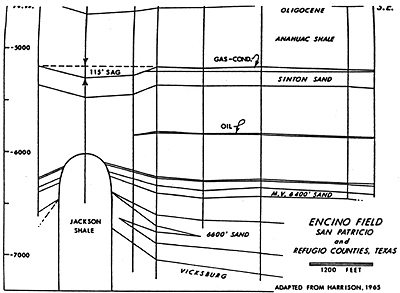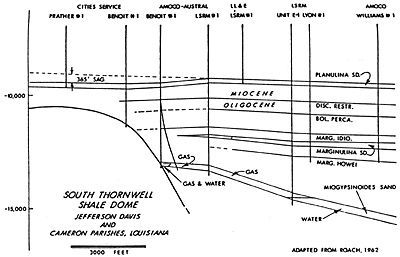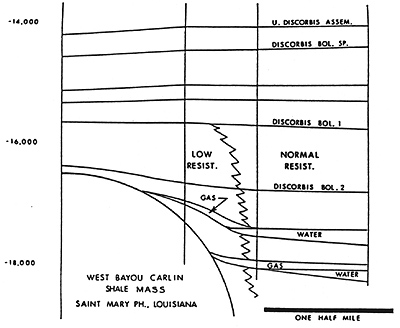Traps Associated with Shale Domes
| Introduction | Nearly all of the oil and gas associated with shale
domes worldwide is in flanking beds; however, some oil
and gas has been found in the rollover rims around the
central sags in overlying beds. |
|
| Rollover rim example | The Encino field of San Patricio and Refugio
counties, Texas has small gas and oil production in
rollover rim traps. The cross section below shows this
feature.
|
|
| Pinchout and truncation example | The South Thornwell shale dome of Jefferson Davis and
Cameron parishes, Louisiana, has associated pinchout and
truncation traps. The cross section below shows these two
traps. Note that the truncation trap has gas and water
production against the shale diapir with gas only
downdip.
|
|
| Upturned and trucation traps | The West Bayou Carlin shale mass of Saint Mary
Parish, Lousiana, has an upturned and a truncation trap.
The cross section below shows these traps. Note the low
resistivity zone in the shale next to the diapir.
|
|
| Exploration mistakes | Most first wells on shale domes are located over the
crest of the shale body. These wells drill through the
crestal sags and directly into shale (such as Cities
Service wells in the South Thornwell example on the
previous page); thus they penetrate nonprospective beds
all the way. It usually takes several more years before
the more prospective outer flank wells are drilled. The
beds below shale domes are not affected by the overlying
domes, and correspondingly oil and gas prospects in
deeper beds are independent of the domes. The principal
production in the Reconcavo basin is from sands below the
diapiric shales. |
|
| Geophysical
Characteristics of Shale Domes |



